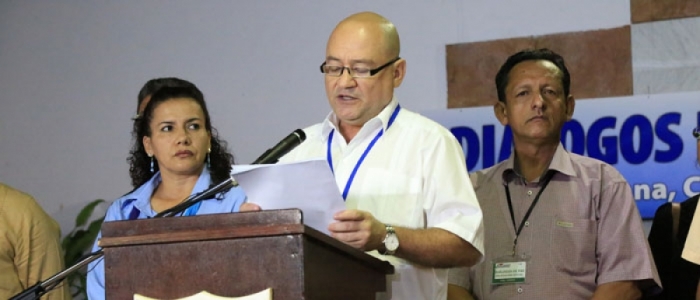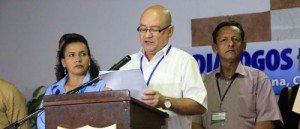

On Oct. 24 in Havana, the FARC brought 18 new members to serve on the Technical Subcommittee on bilateral ceasefire and surrender of weapons.Photo: FARC-EP


On Oct. 24 in Havana, the FARC brought 18 new members to serve on the Technical Subcommittee on bilateral ceasefire and surrender of weapons.
Photo: FARC-EP
The U.S. State Department announced on Feb. 20 that it would send a representative to the peace talks between the Colombian government and the FARC-EP (Revolutionary Armed Forces of Columbia-People’s Army) to be held in Havana, Cuba. That same day, the Peace Delegation of FARC — which is the revolutionary opposition to the Colombian government — issued a statement saluting this step and saying in part, “We consider it a necessity, given the presence and the permanent impact that the United States has in the political, economic and social life of Colombia, that the U.S. would now be able to contribute to the establishment of social justice and true democracy, and to overcome inequality and poverty, which is the right way to open the path to peace.”
U.S. perspective is different
During a meeting in December 2014, Colombian President Juan Manuel Santos asked of U.S. Secretary of State John Kerry that the U.S. “take a more direct role in and be more directly in support of the peace process.” (state.gov)
For this role the U.S. chose Bernard Aronson, former assistant secretary of state for Inter-American Affairs from 1989-93, who was involved in the peace processes in El Salvador and Nicaragua. In El Salvador, Aronson refused to sign an order to cut U.S. funding for death squads. In Nicaragua he is notorious for his statement: “The great myth of the 20th century is that left-wing fascism is different from right-wing fascism.” (“Contra Aides,” Mother Jones, October 1987)
Aronson is on the Board of Directors of the National Democratic Institute, an organization created by the U.S. government through the infamous National Endowment for Democracy that provides funding for opposition right-wing groups in Latin America. He also has financial connections, having served as director for the investment firm Goldman Sachs and having founded his own firm, ACON Investments.
But it was Aronson himself during the Feb. 20 press conference who revealed the U.S. role in Colombian negotiations. By saying that the U.S. will stand by the Santos government, he already made its partisan intent clear. He reinforced that stance by declaring that it is time that the FARC forever renounce violence, without even mentioning the violence of the Colombian state. He ended his talk by referring to the riches of Colombia, saying, “The World Bank said that Colombia is the best place in Latin America to do business.” (state.gov)
While the U.S. presence is important for the peace process, for the reasons stated by the FARC, it is essential to briefly review the role of U.S. intervention in Colombia in order to clearly highlight its character.
U.S. intervention in Colombia
To show how extensive the U.S. role is, it is only necessary to mention a few facts to remind us that much of the suffering of the Colombian people was conceived of in the White House, the Pentagon and the offices of the major mining, petroleum and chemical transnational corporations, as well as the U.S. agricultural monopolies, with the complicity of the Colombian elites and the Colombian government.
This started with the violations and massacres of banana farmers by the United Fruit Co. in 1928, when some 2,000 workers were killed. It continues to the most recent terrorist acts of Chiquita, Dole, Del Monte and Coca Cola corporations, which pay paramilitary squads to beat up and even murder their workers.
The suspected role of the CIA in the assassination of the popular political leader Jorge Eliecer Gaitan in 1948 is still under investigation. At issue is the CIA’s refusal to disclose classified documents about that murder, which opened the door to what is known as the “Great Violence,” which has lasted until today.
Also important is the U.S. role in the establishment of the paramilitary forces themselves, even before the founding of the FARC-EP, and the so-called LASO Plan of bombings and annihilation used against peasant resistance in Marquetalia province, which led to the founding of the FARC insurgency.
We should not forget Washington’s Plan Colombia, which began in 1999 and has resulted in an escalation of social conflict with enormous implications in terms of increasing poverty, disease, violations of human and labor rights and massacres; mass poisonings and destruction of food crops by Monsanto chemicals; and the internal displacement of millions of Colombians.
It is because of this U.S. responsibility for perpetuating the war against the Colombian people that Washington must be part of the peace process.
Achievements of peace talks
The talks began with exploratory meetings in 2011. They have brought hope to the Colombian people that they will finally achieve the peace that they seek, which has been so elusive. It has been a unique process with breakthroughs as well as huge obstacles and difficulties.
Up to now, the talks have achieved partial agreements in the areas of agricultural development, political participation of the insurgency in Colombia’s future and a solution to the problem of illicit drugs. Currently they are discussing questions involving the victims of the conflict.
How the peace process has developed deserves a separate article. However, it is necessary to mention the active participation of several organizations and of the Colombian people themselves, including victims of the conflict, who have enriched the discussions with their contributions. Five groups of victims traveled to Havana on several occasions to intervene directly in the process.
During these years various forums were held in Colombia to provide suggestions. A subcommittee on gender was formed to ensure that the new Colombia arising out of these dialogues is a country without gender discrimination. There have been special hearings with organizations of women and the lesbian, gay, bi and trans population in Colombia. A Historical Commission of the Conflict and its Victims was established to study the causes with a view toward ending the conflict.
The FARC has proposed holding a constituent assembly where the people decide the future of the implementation of the agreements.
Although the process is making gains, it still confronts powerful forces. The FARC has demanded a bilateral ceasefire so that negotiations can be held in an atmosphere of peace. So far, the government has rejected this proposal. On Dec. 17, however, the FARC insurgency announced a unilateral and indefinite ceasefire to demonstrate its desire to achieve peace.
Now in Spain, President Santos said, “We are nearing the time for starting the discussion of a bilateral ceasefire. Precisely tomorrow morning, Tuesday, five active-duty generals and an admiral will go to Havana to initiate this process.” (Telesur, March 2)
On Oct. 24 in Havana, the FARC brought 18 new members to serve on the Technical Subcommittee on bilateral ceasefire and surrender of weapons. Their aim is “to contribute to the analysis of experiences, generate and discuss initiatives and proposals [and] give input, expedite and facilitate discussions of the plenipotentiaries of the national government and the FARC-EP, to permit the implementation of agreements leading to the end of the conflict.” (resistencia-colombia.org)
As stated, the talks are at a crucial stage when solidarity movements, particularly in the United States, have an essential role to express solidarity with the insurgency and the Colombian people, expose the criminal role of the U.S., and pressure the White House to abandon any attempt to undermine the negotiations.
Newark, New Jersey Over 250 people, representing over 250 New Jersey endorsing community groups, attended…
Special to Workers World The following is a press release issued on April 24, 2025,…
dear Larry Krasner, we heard you sued Elon Musk over his corrupt million election giveaways…
Unions join forces against harassment and deportation of members When 200 immigrant workers – from…
Larry Holmes First Secretary Workers World Party Dear Comrade, Under the assignment of the Central…
Download the PDF Black and white version All out for May Day! Students defend pro-Palestine…